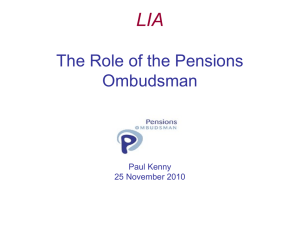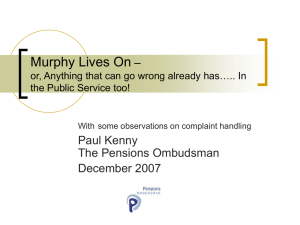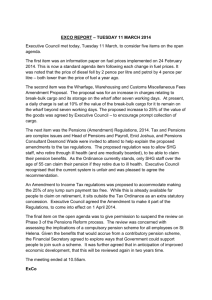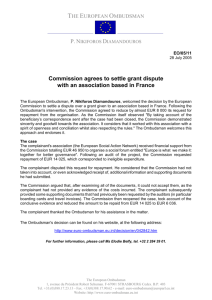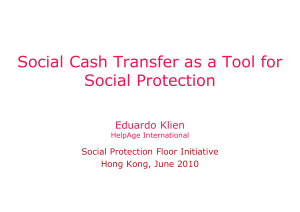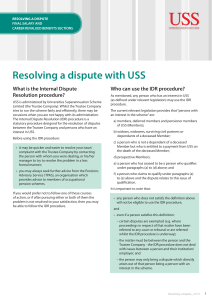2011-09-01 Archive - Presentation to APTI
advertisement
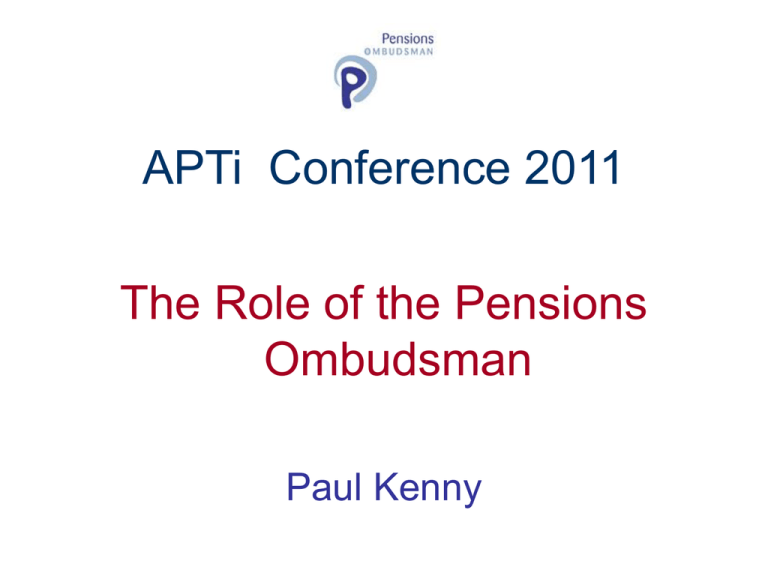
APTi Conference 2011 The Role of the Pensions Ombudsman Paul Kenny Why is there a Pensions Ombudsman? • The Pensions Act, 1990, was the first attempt to regulate the conduct of Occupational Pension Schemes • Pensions Board set up as the Regulator • Criminal offences created • Extensive powers of investigation into “state and conduct” (S.18) • Can Prosecute offences under the Act Why is there a Pensions Ombudsman? -2 • To fill a gap in the Pensions Act: Board can investigate, prosecute, but not order redress: • In 2002, Office of the Pensions Ombudsman established (Pensions Amendment Act, 2002) – To investigate complaints of maladministration in relation to pension schemes and PRSAs – To award redress in case of financial loss – To decide matters of fact or law • Maladministration and non-compliance are not always the same thing The Legal Position • Determinations are binding on all parties • Can be enforced by Order of the Circuit Court - on the application of the Complainant or of the Pensions Ombudsman* • May be appealed to the High Court within 21 days • PO can prosecute for failure to provide information &c. Enforcement Orders also possible in these cases *Minister SFA pre-March 2010 Who Can Complain? • an actual or potential beneficiary – a member or a former member – a surviving dependant – a person claiming to be a member or a surviving dependant – a contributor to a PRSA – a personal representative of a member or contributor – a widow or widower of a member or contributor – If a person cannot act for themselves, a representative may make the complaint – No charge to complainants Against Whom? • • • • Former / trustee Former / employer Former / PRSA provider Other category “to be prescribed” – That means Regulations – Statutory Instrument • Regulations: “Administrator” includes persons • • • • Providing administration service To whom S.59 duties delegated Interpreting or applying scheme rules To whom PRSA provider has delegated Time Limits • If event complained of occurred before “Appointment Day” (28 April, 2003),time limit is six years back from date of signature of 2002 Act* – i.e., 13 April 1996. • If post- Appointment Day, either – Six years from the date of the event, or – Three years from the date complainant knew or ought to have known…. *Pensions (Amendment) Act 2002 This is being tested… • Complaint regarding failure to pay benefits • Benefit vested (Leaving through no fault) many years ago • Benefits surrendered by ER/Trustee in March 1996 • PO has taken the view that “action” in this case is failure to pay the benefits when they fell due under the rules – ongoing trustee duty, not discharged • Trustee has appealed - Judgment awaited Before a Complaint is Taken • Internal Disputes Resolution • Complaint in writing • To trustees (Occupational Pension Scheme and Trust RAC) • To Minister (Public Authority) • To Provider (PRSA) Unless…… • Dispute or complaint already subject to investigation by the Board – Which certifies – “completed or terminated…………” • Scheme in Winding Up • Frozen Scheme with no Employer trading • From 2006, if PO thinks it appropriate to waive – this option is available only in the private sector Exhaustion of IDR • After three-month deadline has passed, PO may consider the IDR process to be “exhausted within its terms”, and proceed to investigation • Also applies to the Public Authority schemes Complaint Considered by “Appropriate Person” • Notice of Determination in writing • Conditions to be met – WHAT HAS BEEN DECIDED…. – WHAT IS RELIED UPON IN DECIDING…. – THAT COMPLAINANT IS NOT BOUND….. – BUT CAN TAKE THE PROBLEM ONWARDS Structure of IDR Considerations in Ireland: • Simple • User-friendly • Saving time • Trustees can decide structure of IDR procedure appropriate to scheme - size, circumstances • IDR result not binding on the complainant Practice Varies • Some schemes have good and established IDR processes –e.g., – Expert adjudicator recommends solution – Committee considers and recommends • If not, advice is available • IR machinery may not be suitable for Pensions • Trustees and HR people need to understand IDR requirement may not suit established “Grievance Procedures” • Employment grievance procedures not open to exemployees, pensioners, dependants Public sector • Would prefer not to be mixed up with this • Traditionally appeals take time – 3 month limit! • Local expertise may be absent – Or people don’t want to know • Appeals procedures not defined; e.g., – S. 11(5) “…may appeal to the Minister…..” – Information sometimes not readily available (though required by Disclosure Regulations) Failure to Operate IDR • Breach of the Pensions Act • Criminal Offence • But sanction on employer / trustee does not give redress to the complainant • PO now has discretion after the expiry of threemonth deadline “to deem the process to be exhausted within its terms” When a complaint is received… • Preliminary Examination – Is IDR required or to be waived? – Is the complaint within terms of reference? – If not: divert to DSFA, FSO, Pensions Board, Financial Regulator, Equality Tribunal • MOUs – If within jurisdiction, can the problem be solved quickly – intervention, mediation, even explanation? Powers • To Summon witnesses • To require production of documents • Powers and privileges of the High Court – Witness immunities and privileges – Statement/admission not admissible in criminal proceedings • To state a case to the High Court • To make report on investigation – Absolute privilege in Defamation • To decide on Jurisdiction • To exchange information with Board and Revenue Commissioners Investigations • Respondents notified • Papers copied to all known to be involved – Invited to name anyone with an interest • Investigators follow up • Oral Hearings possible – complainants often request them but they are seldom granted in practice - usually what they actually want is a meeting Oral hearings • Evidence under oath • May be held in public • Not often used – Usual conditions: – Dispute of fact not solved from the papers – Person’s good name at stake – Conflict of evidence – veracity of witnesses • These conditions are published on the Website Determination • Pensions Ombudsman may give Preliminary View – Time allowed for parties to respond to this • PO makes Determination • Final and binding – can be enforced by Circuit Court Order • Appeal to the High Court within 21 days Other Matters • Jurisdiction may overlap with that of Pensions Board, Financial Services Ombudsman, Financial Regulator, Equality Tribunal • Memoranda of Understanding with FSO, Board, Regulator, Revenue Commissioners, ODCE • MoU with UK Pensions Ombudsman – joint jurisdiction Other Matters, cont’d • Staff are Civil Servants in the Service of the State • Overall cost €1Million p.a. Main Types of Complaint • OTOR: – Referral to Ombudsman, Regulator, or out of time • • • • • • • Failure to remit contributions (106 - + 49%) Calculation of Benefits: (104 - -8%) Fund values (34 – -59%) Problems with Winding-up (22 - +57%) Purchase of added years (public sector) (44 - n/c) Disclosure of information (25 - -49%) Failure to grant early retirement – solvency issues and ill health (37 – n/c) Overall 2010 down 25%; 2009 up 71%; 2008 up 49% Compliance with Pensions Act • Most trustees and employers comply with most of the Act • Most Common failure is in disclosure of information • Worst failure is in remittance of contributions – S. 58A requires employers to remit all contributions (DC) or employee contributions (DB) within 21 days of month end – Confirm remittance, e.g., on payslip – Extra disclosure in new Regulations • Theft of contributions Disclosure of Information • Many complaints lie in failure of communication • Merely to adhere to the Disclosure Requirements does not represent high quality communication • Quantity -v- Quality • Regulation and supervision – small print – Legally correct but incomprehensible – What’s wrong with using English? Not all complaints are serious – Not pensioned on all of his service – shortfall in benefits • Misinformation on transferred service – overstated by 100 days - “loss” was €3.38 per fortnight • PO cannot compensate for loss of expectation – Civil servant missing pension credit for ONE day of his service • It was a strike day – One man complained that trustees hadn’t told him inflation would erode the value of his pension – Complainant insisted on being paid by cheque, then complained compensation for EFT not included in pensionable pay Reporting • Reports are absolutely privileged • Annual Reports and Digest of cases – Protection of identities – Name and shame? – If Complainant goes public…. • Prosecutions for non-production of information – Criminal sanctions • Applications for enforcement of discovery Legal Proceedings • Apart from appeals and JR, prosecutions in the District Court for failure to comply with requirement for information – 9 convictions in 2010 – Fines €200-3500; costs €1300- 2300 – One under appeal to Circuit Court • Power of Enforcement – Primary enforcer should be the Complainant – Application to circuit Court – Minister’s Power to apply now given to PO • Office of the Pensions Ombudsman 36 Upper Mount St, Dublin 2 • 01 647 1650 • 01 676 9577 • www.pensionsombudsman.ie • info@pensionsombudsman.ie
